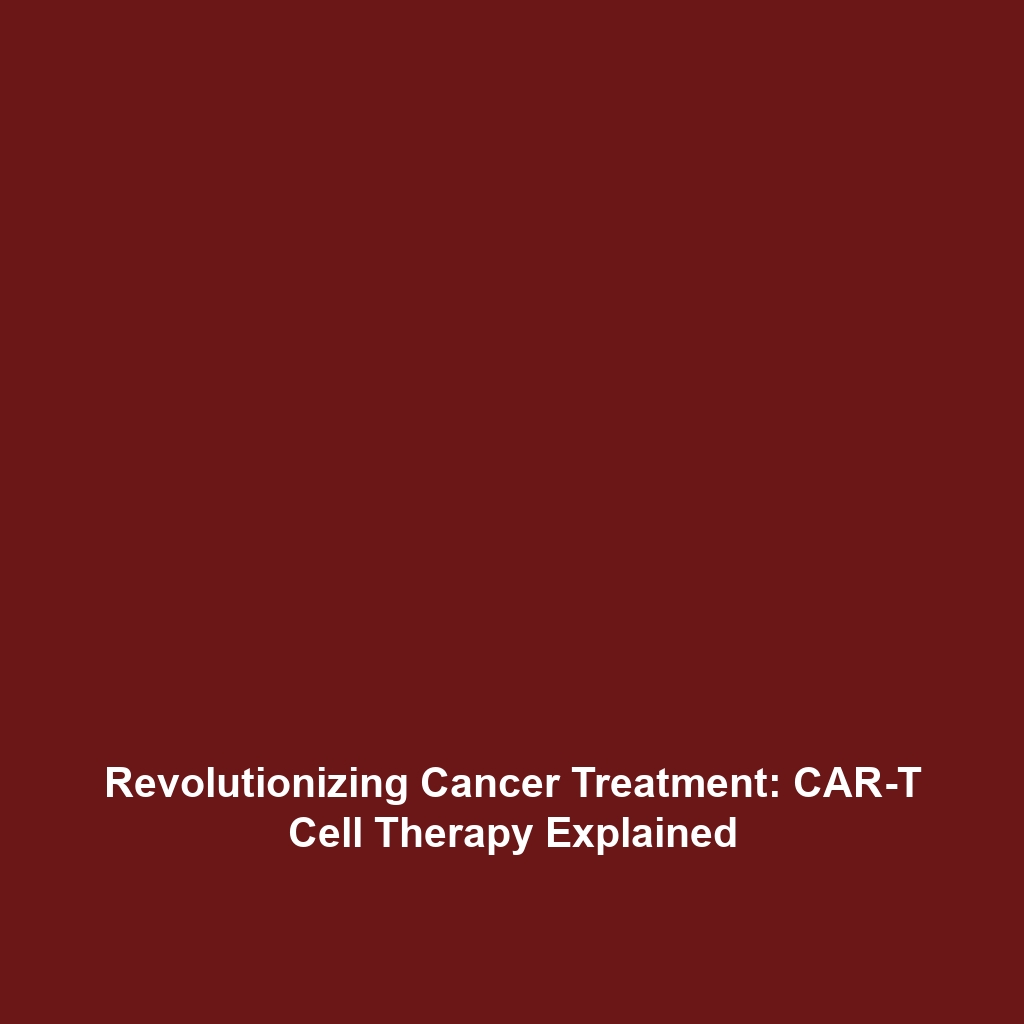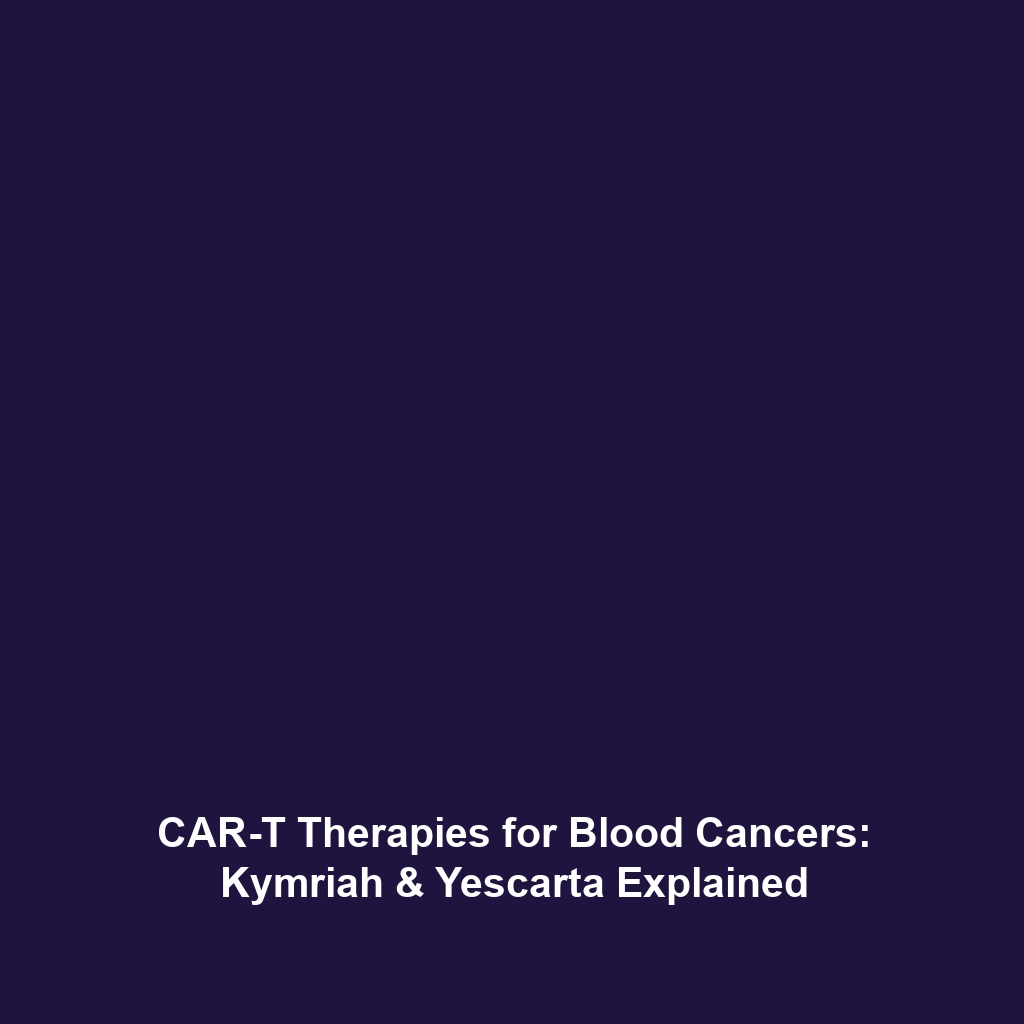CAR-T Cell Therapy: Engineering a Patient’s Own Immune Cells to Attack Cancer
Introduction
CAR-T Cell Therapy represents a groundbreaking advancement in the field of immunotherapy & cancer treatment. By harnessing and engineering a patient’s own immune cells, this innovative approach offers a personalized way to target and destroy cancer cells. Its significance lies not only in its direct application to hematologic malignancies but also as a model for developing therapies for solid tumors. In an era where traditional cancer treatments often fall short, CAR-T Cell Therapy symbolizes a beacon of hope for many patients battling resistant cancers.
Key Concepts
Understanding CAR-T Cell Therapy
CAR-T (Chimeric Antigen Receptor T-cell) therapy involves altering T-cells, a type of white blood cell, to equip them with special receptors that allow them to identify and eliminate cancer cells. This process includes:
- Cell Collection: T-cells are extracted from the blood of the patient.
- Genetic Engineering: In the lab, T-cells are genetically modified to produce CARs on their surface.
- Cell Expansion: The engineered T-cells are multiplied in the laboratory.
- Infusion: The expanded CAR-T cells are infused back into the patient, where they can now seek out and destroy cancer cells.
This therapy falls under the larger umbrella of immunotherapy, which employs the body’s immune system to combat cancer, making it a pivotal area of clinical research and application.
Applications and Real-World Uses
CAR-T Cell Therapy has shown remarkable success in several areas of cancer treatment, particularly its applications in:
- Acute Lymphoblastic Leukemia (ALL): CAR-T therapy has been particularly effective in children and young adults with relapsed or refractory ALL, resulting in remission rates of over 80%.
- Non-Hodgkin Lymphoma: Approved treatments like Kymriah and Yescarta have drastically improved outcomes for patients with large B-cell lymphoma.
- Multiple Myeloma: Ongoing trials and FDA approvals are paving the way for CAR-T therapies to treat this once difficult-to-manage cancer.
The successes demonstrate how CAR-T Cell Therapy is transforming immunotherapy & cancer treatments, making it a vital topic for ongoing research and clinical application.
Current Challenges
While CAR-T Cell Therapy has created a paradigm shift in cancer treatment, several challenges remain:
- Cost Effectiveness: The high cost of CAR-T therapies can limit accessibility for many patients.
- Cytokine Release Syndrome: Some patients may experience severe side effects, including cytokine release syndrome (CRS), which necessitates careful management.
- Limited Efficacy in Solid Tumors: Current CAR-T therapies show less effectiveness against solid tumors compared to hematologic cancers.
Addressing the challenges of CAR-T Cell Therapy is crucial for enhancing its use as a cornerstone in immunotherapy & cancer.
Future Research and Innovations
The landscape of CAR-T Cell Therapy is evolving, with several exciting areas of research:
- Next-Generation CARs: Innovations such as dual-target CARs and armored CARs are being studied to improve efficacy and safety profiles.
- Combination Therapies: Research is exploring the synergistic effects of combining CAR-T with checkpoint inhibitors and other immunotherapies.
- Off-the-Shelf CAR-T Products: Development of universal CAR-T cells that can be used across multiple patients could radically change accessibility and reduce costs.
These innovations highlight the potential that lies ahead in advancing CAR-T Cell Therapy as a mainstay in immunotherapy & cancer management.
Conclusion
CAR-T Cell Therapy has emerged as a promising solution within the realm of immunotherapy & cancer, representing a shift towards personalized medicine. While challenges remain, ongoing research and innovations offer hope for overcoming these barriers. As we continue to explore the possibilities of CAR-T Cell Therapy, stakeholders should consider advocating for broader access and further investment in this transformative treatment modality.
For more information on related topics, explore our sections on Immunotherapy Advances and Personalized Cancer Treatment Options.

